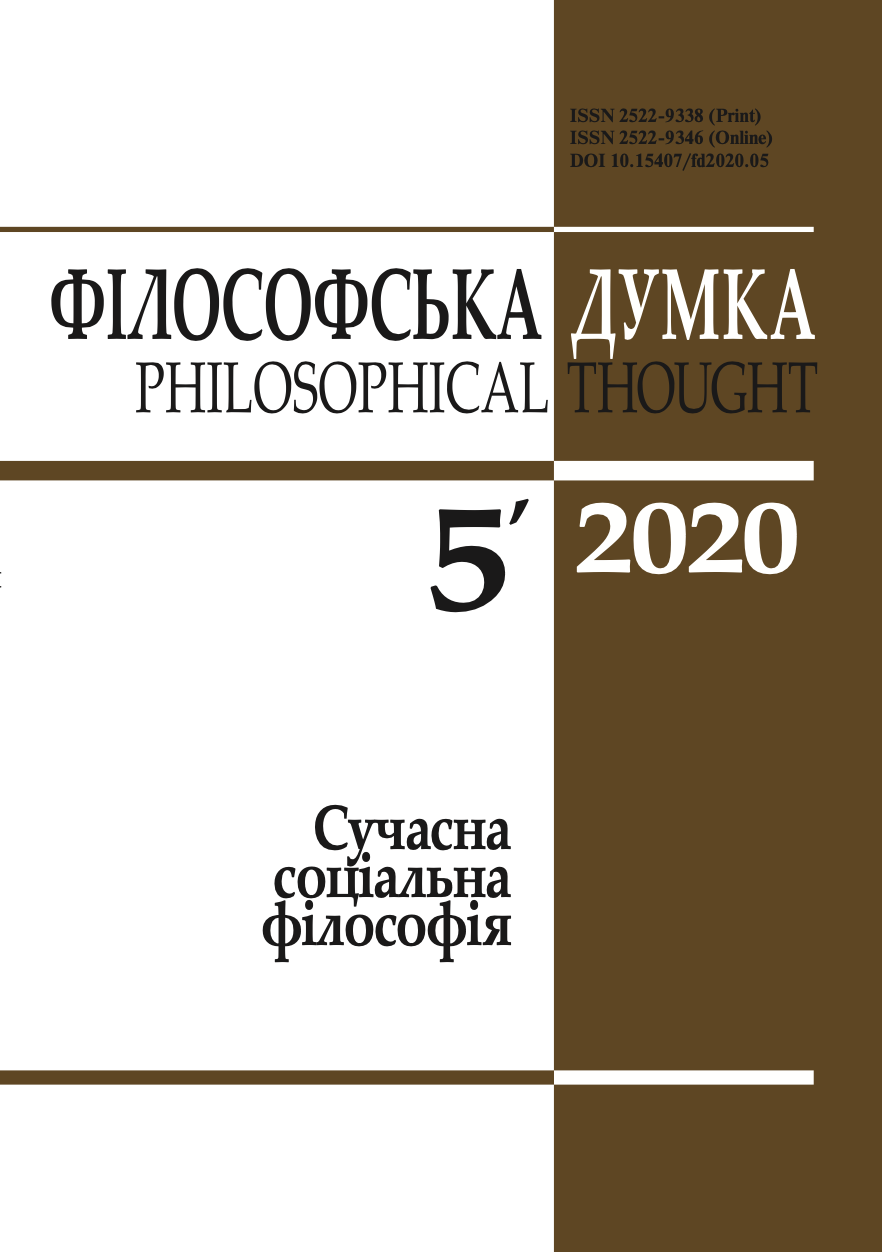DELIBERATIVE DEMOCRATIC THEORY AND “THE FACT OF DISAGREEMENT”
DOI:
https://doi.org/10.15407/fd2020.05.073Keywords:
deliberative democracy, Habermas, Rawls, well-ordered society, disagreement, liberalismAbstract
The development of the theory of deliberative democracy is connected to the completion of two tasks. The first is to combine broad political participation with the rationality of the political process. The second is to ensure the political unity of modern societies, which are characterized by a pluralism of often incompatible values, norms, and lifestyles. Within the framework of this theory, the key democratic procedure is rational deliberation open to all interested parties. The purpose of this procedure is to reach an agreement, as stated in the theory of J rgen Habermas. However, experimental studies of deliberative practices show that they may result not in agree- ment but in the radicalization of positions.
Unlike Habermas, John Rawls believes that a consensus on values and norms is unattaina- ble. His theory of political liberalism attempts to answer the question of how political unity is possible in practically insoluble conflict, that is, in a situation of disagreement. He proposes the ideal of a well-ordered society with the assumption that a just society is one in which there is no agreement on comprehensive doctrines, but there is a consensus on the basic principles of jus- tice. However, Rawls’s theory, in turn, faces a number of significant problems. For example, he was forced to admit that the democratic culture of society is a prerequisite for the formation of basic principles of justice in a well-ordered society.
Rawls’s idea about the connections among disagreement, political freedom, and democra- cy influenced the further development of the theory of democracy, stimulating the search for different models of decision-making and the formation of political will without rational agree- ment. After all, the possibility of democracy lies in the conflict of ideas about justice and good.
References
Beerbohm, E. (2012). In Our Name: The Ethics of Democracy. Princeton and Oxford: Princeton University Press.
https://doi.org/10.23943/princeton/9780691154619.001.0001
Bessette, J. (1980) Deliberative Democracy: The Majority Principle in Republican Government In: R.A. Goldwin, W.A. Schambra (Eds.), How Democratic is the Constitution? (pp. 102- 116).Washington, D.C.: AEI Pres.
Bessette, J. (1994). The Mild Voice of Reason: Deliberative Democracy & American National Government. Chicago: University of Chicago Press.
Besson, S. (2005) The Morality of Conflict. Reasonable Disagreement and the Law. Oxford, Port- land: Hart Publishing.
Bishop B. (2008). The Big Sort: Why the Clustering of Like-Minded American is Tearing Us Apart. Boston, New York: Houghton Mifflin Harcourt.
Gutmann, A., Thompson, D. (1996). Democracy and Disagreement. Cambridge, London: The Bel- knap Press Of Hurvard University Press.
Gutmann, A., Thompson, D. (1999). Democratic Disagreement. In: S. Macedo (Ed.), De libe- rative Politics, Essays on Democracy and Disagreement (pp. 243-281). Oxford: Oxford University Press.
Hedrick, T. (2010). Rawls and Habermas. Reason, Pluralism, and the Claims of Political Philosophy. Stanford: Stanford University Press.
https://doi.org/10.1515/9780804774758
Habermas, J. (1990). Moral Consciousness and Communicative Action / Tr. by Ch. Lenhardt, Sh. Weber Nicholsen. Cambridge: Polity Press.
Habermas, J. (1998). The Inclusion of the Other. Studies in Political Theory / Ed. by C. Cronin, P. De Greiff. Cambridge: The MIT Press.
Habermas, J. (2009). Europe. The Faltering Project / Tr. by C. Cronin. Cambridge: Polity Press. Landemore, H. (2017). Beyond the Fact of Disagreement? The Epistemic Turn in Deliberative Democracy. Social Epistemology, 31 (3), 277-295.
https://doi.org/10.1080/02691728.2017.1317868
Mouffe, Ch. (2000). The Democratic Paradox. London, New York: Verso.
Neblo, M.A. (2000). Change for the better? Linking the mechanisms of deliberative opinion change
to normative theory. URL: https://polisci.osu.edu/sites/polisci.osu.edu/files/_change%20 for%20the%20better_%20linking%20the%20mechanisms%20of%20deliberative%20 opinion%20change%20to%20normative%20theory_.pdf (accessed 15.02.2020).
Reidy, D.A. (2007). Reciprocity and Reasonable Disagreement: From Liberal to Democratic Legitimacy. Philosophical Studies: An International Journal for Philosophy in the AnalyticTradition, 132 (2), 243-291.
https://doi.org/10.1007/s11098-005-2216-6
Rawls, J. (1980). Kantian Constructivism in Moral Theory. The Journal of Philosophy, 77 (9), 515-572.
https://doi.org/10.2307/2025790
Rawls, J. (1985). Justice as Fairness: Political not Metaphysical. Philosophy and Public Affairs, 14 (3), 223-251.
Rawls, J. (1988). The Priority of Right and Ideas of Good. Philosophy and Public Affairs, 17 (4), 251-276.
Rawls, J. (1995). Political liberalism: Replay to Habermas. The Journal of Philosophy, 92 (3), 132-180.
https://doi.org/10.2307/2940843
Rawls, J. (2000). The Law of Peoples. Cambridge, London: Harvard University Press.
Rawls, J. (2005). Political Liberalism. 3nd ed. New York: Columbia University Press.
Sanders, L. (1997). Against Deliberation. Political Theory, 25 (3), 347-376.
https://doi.org/10.1177/0090591797025003002
Schkade, D., Sunstein, C.R., Hastie, R. (2010). When Deliberation Produces Extremism. Critical Review, 22 (2-3), 227-252.
https://doi.org/10.1080/08913811.2010.508634
Waldron, J. (1999). Law and Disagreement. Oxford: Clarendon Press.
Downloads
-
PDF (Українська)
Downloads: 663
Published
How to Cite
Issue
Section
License
Authors who publish with this journal agree to the following terms:
- Authors retain copyright and grant the journal right of first publication.
- Authors are able to enter into separate, additional contractual arrangements for the non-exclusive distribution of the journal's published version of the work (e.g., post it to an institutional repository or publish it in a book), with an acknowledgement of its initial publication in this journal.
- Authors are permitted and encouraged to post their work online (e.g., in institutional repositories or on their website) prior to and during the submission process, as it can lead to productive exchanges, as well as earlier and greater citation of published work (See The Effect of Open Access).


